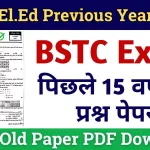Special BSTC (Basic School Teaching Course) is a specialized course aimed at providing foundational training for aspiring teachers who wish to work with students requiring special education. The course focuses on equipping future educators with the necessary skills, knowledge, and techniques to effectively teach and support students with diverse learning needs.
Objectives of Special BSTC
The primary objective of the Special BSTC course is to train teachers who can cater to the educational needs of students with disabilities or special needs. This includes understanding the psychological, emotional, and educational requirements of these students and implementing teaching strategies that promote inclusive education. The course aims to:
- Equip teachers with the ability to identify and assess the needs of special students.
- Develop skills for designing and delivering individualized education programs (IEPs).
- Train teachers in using assistive technology and other resources to support learning.
- Promote inclusive teaching practices that accommodate students with varying abilities.
- Provide knowledge of legal and ethical considerations in special education.
Curriculum and Subjects in Special BSTC
The curriculum of the Special BSTC course is designed to cover a wide range of topics essential for effective special education. It includes both theoretical knowledge and practical training to ensure that teachers are well-prepared for the classroom environment. The subjects commonly included in the curriculum are:
Introduction to Special Education
- Overview of special education and its importance.
- Understanding different types of disabilities and special needs.
Child Development and Psychology
- Stages of child development and their implications for learning.
- Psychological theories relevant to special education.
Assessment and Evaluation
- Techniques for assessing the needs and abilities of special students.
- Developing and implementing IEPs.
Teaching Strategies for Special Education
- Adapting teaching methods to suit individual learning styles.
- Classroom management strategies for inclusive education.
Assistive Technology in Education
- Use of technology to support learning and communication for special students.
- Training in various assistive devices and software.
Legal and Ethical Issues in Special Education
- Understanding the rights of special students.
- Ethical considerations in teaching and interacting with special students.
Communication and Collaboration
- Building effective communication with students, parents, and other educators.
- Collaborating with professionals like therapists and counselors.
Practical Training and Internship
- Hands-on experience in special education settings.
- Supervised teaching practice to apply theoretical knowledge.
Eligibility Criteria for Special BSTC
To enroll in the Special BSTC course, candidates must meet specific eligibility criteria. These criteria ensure that the individuals taking up this course have a basic understanding and commitment to working with special students. The general eligibility requirements include:
- Educational Qualification: Candidates must have completed their higher secondary education (10+2) or equivalent from a recognized board. Some institutions may also require a minimum percentage of marks, usually around 50-55%.
- Age Limit: The age limit for Special BSTC is typically between 18 to 28 years. However, age relaxations may be available for reserved categories as per government regulations.
- Entrance Exam: Many institutions require candidates to clear an entrance exam specifically designed for Special BSTC admissions. The exam may test general knowledge, teaching aptitude, and understanding of special education.
Admission Process for Special BSTC
The admission process for the Special BSTC course generally involves the following steps:
- Application: Candidates must fill out an application form, either online or offline, provided by the institution offering the course. The application form requires personal details, educational background, and other necessary information.
- Entrance Exam: As mentioned earlier, many institutions conduct an entrance exam for admission to the Special BSTC course. The exam assesses the candidate’s aptitude for teaching and understanding of special education concepts.
- Counseling: Based on the entrance exam results, candidates are shortlisted for counseling sessions. During counseling, candidates can choose their preferred institutions and specialization within special education.
- Document Verification: After the counseling process, candidates must submit their original documents for verification. This includes educational certificates, identity proof, and other necessary documents.
- Admission Confirmation: Once the documents are verified, and the necessary fees are paid, candidates receive admission confirmation and can begin their coursework.
Career Prospects After Special BSTC
Completing the Special BSTC course opens up several career opportunities in the field of education. Graduates can work in various capacities, helping students with special needs achieve their academic and personal goals. Some of the career options include:
- Special Education Teacher
- Teaching in special schools or inclusive classrooms.
- Designing and implementing individualized education programs.
- Resource Teacher
- Providing additional support to students with special needs in mainstream schools.
- Working closely with regular teachers to adapt curriculum and teaching methods.
- Educational Consultant
- Advising schools and educational institutions on best practices for inclusive education.
- Conducting workshops and training for teachers and staff.
- Counselor or Therapist
- Providing emotional and psychological support to students with special needs.
- Collaborating with teachers and parents to address behavioral and learning challenges.
- Administrator or Coordinator
- Managing special education programs within schools or educational organizations.
- Overseeing the implementation of policies and programs for special students.
- Researcher or Academician
- Conducting research on special education methods and practices.
- Teaching and mentoring future special education teachers in colleges and universities.
Challenges in Special Education
While special education is a rewarding field, it also comes with its own set of challenges. Understanding these challenges can help future educators prepare better and develop effective strategies to overcome them. Some common challenges include:
- Lack of Resources
- Limited availability of specialized teaching materials and assistive technology.
- Inadequate funding for special education programs in some regions.
- Teacher Training
- Need for continuous professional development to keep up with new teaching methods and technologies.
- Ensuring that teachers are equipped to handle diverse needs in the classroom.
- Inclusive Education
- Balancing the needs of special students with those of their peers in an inclusive setting.
- Addressing potential social and emotional challenges faced by special students in mainstream schools.
- Parental Involvement
- Encouraging active participation from parents in their child’s education.
- Managing expectations and providing guidance to parents on supporting their child’s learning at home.
- Legal and Ethical Considerations
- Understanding and complying with laws related to the rights of special students.
- Addressing ethical dilemmas in teaching and decision-making.
Importance of Special BSTC in Modern Education
The Special BSTC course plays a crucial role in modern education by promoting inclusive practices and ensuring that all students, regardless of their abilities, have access to quality education. The course not only prepares teachers to work with special students but also fosters a culture of acceptance and understanding within the educational community. Some key reasons why Special BSTC is important include:
- Promoting Inclusivity
- Encouraging schools to adopt inclusive education practices that accommodate all students.
- Reducing stigma and discrimination associated with disabilities.
- Supporting Diverse Learning Needs
- Providing teachers with the tools and techniques to address the unique needs of special students.
- Ensuring that all students have equal opportunities to succeed academically.
- Fostering Empathy and Understanding
- Helping teachers and students develop empathy towards individuals with special needs.
- Promoting a positive and supportive learning environment.
- Addressing the Teacher Shortage
- Meeting the growing demand for qualified special education teachers in schools and educational institutions.
- Ensuring that special students receive the attention and support they need.
Special BSTC vs. General BSTC: Key Differences
While both Special BSTC and General BSTC are designed to train teachers, there are significant differences between the two courses. Understanding these differences can help aspiring teachers choose the right path based on their interests and career goals.
- Focus: Special BSTC specifically focuses on training teachers to work with students with special needs, while General BSTC provides a broader training for teaching in regular classrooms.
- Curriculum: The curriculum of Special BSTC includes specialized subjects like assistive technology, individualized education programs, and strategies for teaching students with disabilities. In contrast, General BSTC covers general teaching methods, classroom management, and subject-specific pedagogy.
- Career Opportunities: Graduates of Special BSTC are typically employed in special schools, inclusive education programs, or as resource teachers in mainstream schools. General BSTC graduates often work as regular classroom teachers or in administrative roles within schools.
- Skills Required: Special BSTC requires a deeper understanding of child psychology, patience, and the ability to adapt teaching methods to suit individual needs. General BSTC focuses on developing general teaching skills and subject knowledge.
How to Prepare for Special BSTC Entrance Exam
Preparing for the Special BSTC entrance exam requires a focused and strategic approach. Since the exam tests general knowledge, teaching aptitude, and understanding of special education, candidates should ensure that they are well-prepared in all areas. Here are some tips to help you prepare:
- Understand the Exam Pattern
- Familiarize yourself with the structure of the exam, including the number of sections, types of questions, and duration.
- Study the Syllabus
- Review the syllabus thoroughly and make a study plan that covers all the topics. Focus on areas like general knowledge, teaching aptitude, and special education concepts.
- Practice Previous Year Papers
- Solving previous years’ question papers can help you understand the exam pattern and identify important topics. It also helps in time management during the actual exam.
- Focus on Teaching Aptitude
- Since the exam assesses your aptitude for teaching, focus on topics like educational psychology, teaching methods, and classroom management.
- Stay Updated with Current Affairs
- General knowledge is an important part of the exam, so keep yourself updated with current events, especially those related to education and special needs.
- Take Mock Tests
- Taking mock tests will help you gauge your preparation level and identify areas where you need to improve. It also helps build confidence and reduce exam anxiety.
- Revise Regularly
- Regular revision is key to retaining the information you have studied. Make sure to revise important topics and practice regularly to keep your knowledge fresh.
Financial Aid and Scholarships for Special BSTC Students
Pursuing a Special BSTC course can be financially demanding for some students. However, several financial aid options and scholarships are available to help ease the burden. These can include:
- Government Scholarships
- Many state and central governments offer scholarships for students pursuing teacher education courses, including Special BSTC. These scholarships may be based on merit, financial need, or specific categories like SC/ST/OBC.
- Institutional Scholarships
- Some institutions offering Special BSTC courses provide their own scholarships or financial aid programs. These may be based on academic performance, entrance exam scores, or other criteria.
- Educational Loans
- Students can also apply for educational loans from banks and financial institutions. These loans typically cover tuition fees, study materials, and other related expenses.
- Private Scholarships
- Several private organizations and NGOs offer scholarships to students pursuing special education courses. These may be need-based or aimed at encouraging students to work in underserved areas.
- Work-Study Programs
- Some institutions offer work-study programs where students can work part-time in exchange for a stipend or tuition waiver. This helps students gain practical experience while supporting their education.
Impact of Special BSTC on the Education System
The introduction of Special BSTC programs has had a significant impact on the education system, particularly in promoting inclusive education. The course has led to the development of a more inclusive and supportive learning environment for students with special needs. Some of the key impacts include:
- Increased Awareness
- The Special BSTC course has helped increase awareness about the importance of special education and the need for trained teachers in this field. It has encouraged more institutions to adopt inclusive education practices.
- Better Support for Special Students
- With more trained special education teachers, schools are now better equipped to support students with special needs. This has led to improved academic outcomes and overall well-being for these students.
- Professional Development
- The course has contributed to the professional development of teachers by providing them with the necessary skills and knowledge to work effectively with special students. This has also led to the creation of more specialized roles within the education sector.
- Policy Changes
- The growing recognition of the need for special education has influenced policy changes at the government level. More resources and funding are now being allocated to special education programs, and there is a greater emphasis on inclusive education in national education policies.
- Community Involvement
- The course has also fostered greater community involvement in special education. Parents, educators, and community members are now more engaged in supporting special students and advocating for their rights.
Conclusion
Special BSTC is an essential course that plays a vital role in shaping the future of special education. By training dedicated and compassionate teachers, the course ensures that students with special needs receive the support and education they deserve. As the demand for inclusive education continues to grow, the importance of Special BSTC will only increase, making it a valuable and rewarding career path for aspiring educators.
Latest Posts
- Step-by-step guide to download and apply for jee mains admit card 202
- Comprehensive 2025 government holidays and recruitment details for job seekers
- JEE Mains Admit Card 2025: Your Step-by-Step Guide to Downloading the Hall Ticket
- Everything You Need to Know About 2025 Government Holidays Recruitment
- Comprehensive Guide to rrb d group recruitment 2025 – Eligibility, Vacancies, and Application
- Detailed guide to nps trust recruitment 2025 vacancies, eligibility and apply process
- Comprehensive guide to hpcl recruitment 2025 notification, vacancies, and application process
- ignou bed admission 2025 complete recruitment guide with eligibility and process
- Comprehensive Guide to Indian Army Agniveer Recruitment 2025 Notification and Jobs
- Everything You Must Know About CBSE Board Exams 2025 Changes & New Rules




